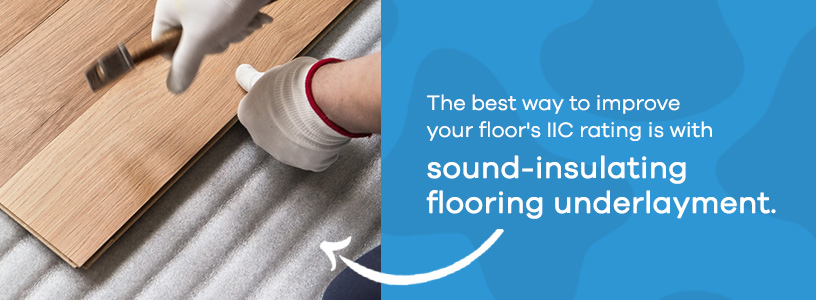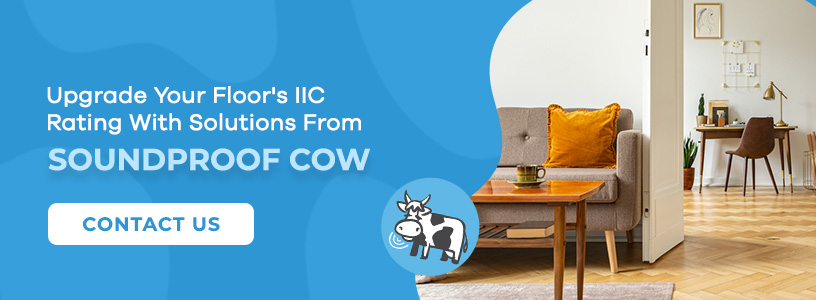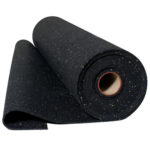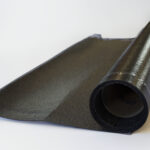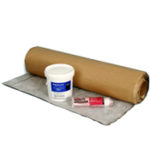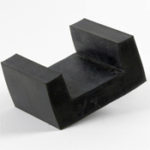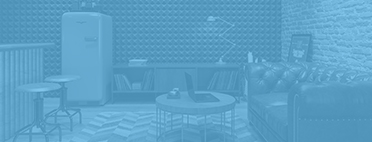
The Impact Insulation Class (IIC) measures how well a floor blocks impact noise.
Learn more about IIC sound ratings and how to improve yours with a flooring underlayment.
What Are Impact Insulation Class Ratings?
IIC ratings assess how well floor-ceiling assemblies reduce impact noise. Impact sounds include footsteps, objects dropping on the floor or furniture moving. Standardized tests measure the IIC rating to determine how well floors insulate sound. The higher the rating, the better a floor assembly reduces impact noise transmission.
How Is an IIC Rating Calculated?
Professionals calculate IIC ratings using the American Society for Testing and Materials (ASTM) testing methods. There are two tests — ASTM E492 in the laboratory and ASTM E1007 in the field. Field-tested floor assemblies have a Normalized Impact Sound Rating (NISR). Testers factor in furnishings for already-built structures.
Acousticians use a device called a tapping machine to measure impact sound. The tool has five hammers that drop to create a series of repetitive taps on the floor assembly. Testers measure the sound pressure in the room in frequencies between 100 hertz (Hz) and 3150 Hz.
Another standard, ASTM E989, compares frequency levels between upper and lower rooms. The average difference determines the single-number IIC rating.
What Is a Good IIC Sound Rating?
The higher the IIC rating, the better the floor blocks impact noise transmission. The lowest rating, around 25, would make it sound like your neighbor is tap dancing on your table. High-rated assemblies are around 85 and up.
Here is a breakdown of low to high IIC ratings:
- IIC 50: You — or your downstairs neighbor — would likely hear a lot of noise through the floors. This is the minimum rating for effective sound reduction.
- IIC 60: This middle-of-the-road rating provides moderate impact noise reduction.
- IIC 65: Most home or building owners want to aim for 65 and above.
IIC ratings largely depend on the flooring material. For example, soft materials like carpeting are much better at improving IIC sound ratings at the source than hard materials like ceramic tiles. Luckily, no matter what flooring material you are working with, you can improve your IIC ratings!
Why Is Impact Insulation Class Important?
Floors with a high IIC sound rating help ensure compliance with building codes. For example, the International Building Code, which applies to most building types, has specific requirements for assemblies separating dwelling units and sleeping units from each other or from public areas.
Greater sound insulation also makes living and working more comfortable in multistory buildings. Impact sound through floors can turn into airborne noise that travels through the air. Underlayment reduces noise transfer through floors, blocking impact noise for a quieter environment. All in all, IIC is an important rating to get right if you want a quiet, comfortable space.
How to Improve Your Floor’s IIC
The best way to improve your floor’s IIC rating is with sound-insulating flooring underlayment. Underlayment is a layer between the top floor and the subfloor. Think of it as a soundproof filling in a flooring sandwich. Materials like rubber or cork block sound and enhance your floor’s longevity.
There are plenty of options to boost your floor’s IIC potential.
1. Impact Barrier QT Flooring Underlayment
Rubber is a top material for blocking impact sound transmission, and this underlayment consists of 92% recycled rubber. The Impact Barrier QT Flooring Underlayment works with tile, hardwood, stone, laminate and more. It comes in a range of thicknesses to suit any soundproofing need. It passes ASTM tests with flying colors for high IIC ratings.
2. PROFLEX™ 90 Underlayment
The PROFLEX™ 90 underlayment has a rubberized membrane that soundproofs tile, stone, and hardwood flooring. Built to withstand even the most extreme temperatures, it also eliminates cracks.
3. Step Above Flooring Underlayment
If you think installing an underlayment is a challenge, think again! The Step Above Flooring Underlayment works well under floating wood flooring, laminate floating floors and engineered floors. This all-in-one solution reduces impact and airborne noise while improving acoustic quality.
Cross-linked polyolefin resin and a polyethylene barrier resist mildew, mold and vapor. But wait, there is more! This versatile underlayment improves thermal insulation, yielding warmer floors and reduced energy loss.
4. Floor Joist Isolators
A nonunderlayment option to control structure-born sounds is to tackle the joists. Floor joists are horizontal beams that transfer loads to vertical beams. Flooring Joist Isolators are U-shaped pieces that fit over joists to reduce vibrational noise. These isolators are an easy and cost-effective way to improve your flooring’s IIC rating. If you love DIY, then easy-to-install Floor Joist Isolators are the answer you are looking for.
Underlayments and joist isolators work well in new floor constructions or spaces where you can access the subfloor.
IIC vs. STC: What Is the Difference?
IIC ratings impact sound between floors, while Sound Transmission Class (STC) measures airborne sound between rooms. Both sound isolation measurements are crucial for residential and commercial buildings. IIC targets structure-borne noise like footsteps, while STC tackles airborne noise like voices.
Like IIC, the higher a material’s STC rating, the better it can block sound. Professionals measure decibels with an audiometer in adjacent rooms. Then, they calculate the sound transmission loss between the spaces. Similar to IIC, STC testing involves testing 16 frequencies between 125 Hz and 4,000 Hz. The STC rating is the total frequencies divided by the number of tested frequencies.
Upgrade Your Floor’s IIC Rating With Solutions From Soundproof Cow
Our high-quality underlayment products turn your floor’s IIC rating from mooo-diocre to marvelous.
Combine our underlayment with A-Team-worthy soundproofing solutions and say goodbye to noisy floors.
Do you have soundproofing questions? We would love to talk it out. Just give us a call at 866-949-9269 or contact us online today!



